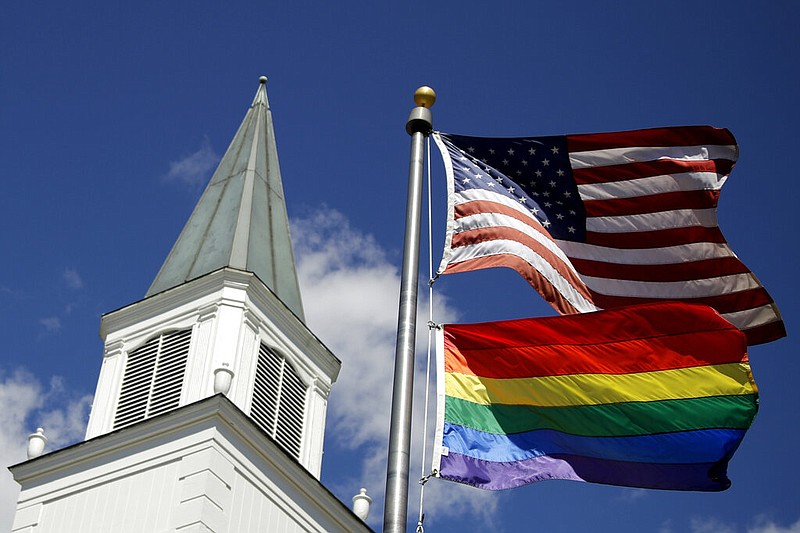HOT SPRINGS -- As Arkansas United Methodists began their annual conference Wednesday, traditionalists and progressives huddled together, trying to craft a plan to facilitate an amicable separation.
The goal was to come up with a proposal that would satisfy both factions, as well as their attorneys, so that language could be introduced, debated and voted upon later today.
In an interview after the conference's morning session, Bishop Gary Mueller portrayed the negotiations as productive.
"We're trying to get it all worked out and get a consensus piece of legislation," he said. "We've done a lot of work. I'm feeling very positive. We're just wrapping up a few details."
Mueller stressed the importance of both sides working together. An agreement, he said, would be "giving witness to what Christ can do with people who come from very different perspectives."
"If we get a high percentage of [the] vote it will be a visible reminder that there's something that's greater than the differences," he added.
With 6.3 million U.S. members, the United Methodist Church is the nation's second-largest Protestant denomination.
It's also the second-largest Protestant denomination in Arkansas, with 117,440 members and average attendance of 43,765 in 2020.
Overall, there are about 630 Methodist churches statewide.
With the national denomination deeply divided, some of the state's largest United Methodist congregations are weighing whether to leave.
Jonesboro First United Methodist Church, with average attendance of 1,577, is one of 35 that have formally begun the disaffiliation process. Others include Searcy First; Heber Springs; Cabot; Grace in Conway and Heritage in Van Buren, a conference official said.
Leaders at Central United Methodist Church in Fayetteville, the state's largest congregation, recently voted to begin "a period of prayer and discernment regarding the current state of the United Methodist Church and Central's place within the Body of Christ," according to Senior Pastor Carness Vaughan.
Arguments over homosexuality have dominated recent meetings of the denomination's General Conference, which normally meets every four years to conduct church business.
Thus far, theological conservatives have repeatedly triumphed at these gatherings, ensuring that the denomination continues to define "the practice of homosexuality" as "incompatible with Christian teaching."
They have struggled, however, to get some church officials to uphold provisions in their Book of Discipline, which bar "self-avowed practicing homosexuals" from being ordained to the ministry and which prohibit the solemnizing of "homosexual unions" by Methodist clergy or inside Methodist churches.
Conservatives are frustrated by the flouting of church discipline in some of the U.S. church's 54 regional bodies, known as annual conferences.
Progressives are fed up with denomination-wide positions they view as unjust.
In his annual episcopal address Wednesday, Mueller urged Methodists to "stay calm and trust the Holy Spirit," adding, "All will be well. We will be amazed what happens when Jesus is in the house."
The Lord's presence is needed, he emphasized, noting drops in church attendance and increasing skepticism about religious institutions.
"Public opinion poll after public opinion poll shows that respect for Christianity is rapidly declining," he said.
In-fighting, he suggested, has the potential to drive people further away.
"They're watching us. They're observing. They're taking note of how our message corresponds to what we say we believe," he added.
The Book of Discipline, as amended in 2019, allows congregations to "disaffiliate" from the United Methodist Church "over issues related to human sexuality," including "the practice of homosexuality" and "the ordination or marriage of self-avowed practicing homosexuality."
But the provision, referred to as Paragraph 2553, has financial stipulations that would be hard for many congregations to meet and it expires on Dec. 31, 2023. Its language expressly forbids it from being used after that date.
Compromise language, unveiled in Jan. 2020, would have made it easier for the two sides to part ways. But the proposal, which was backed by many traditionalists as well as progressives, needed the backing of the church's quadrennial General Conference.
Because of covid, the 2020 gathering was pushed back to 2021 and then 2022 before being postponed, yet again, to 2024 -- ensuring that no vote can take place before Paragraph 2253 expires.
Wednesday, church leaders were examining another section of the Book of Discipline: Paragraph 2548.2.
It allows a congregation to transfer to another denomination with the consent of the presiding bishop and the annual conference, among others. Importantly, it provides more leeway in determining the terms of separation and contains no sunset clause.
With Mueller now 68 years old, members of the conference had been anticipating that he would retire soon. Church law governs when a bishop must retire, but the timetables are uncertain because of covid-related cancellations and delays.
Mueller learned Wednesday morning that he'll be able to remain a bishop until the year 2024, a timeline that would allow him to help steer the conference through its current challenges, assuming the church's jurisdictional conference reassigned him to Arkansas.
Traditionalists welcomed news Wednesday that Mueller's retirement will be delayed.
"We were really upset that he might leave in September," said John Miles, senior pastor of First United Methodist Church in Jonesboro.
No one would know what to expect with a new bishop in place, he added.
"It could be a lot worse," he said.
With Mueller, "We've got a fair process and a fair deal and a fair bishop," he said.
